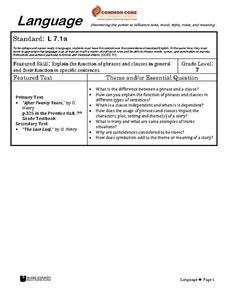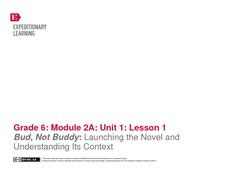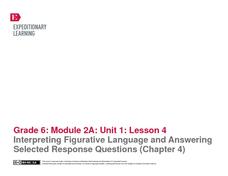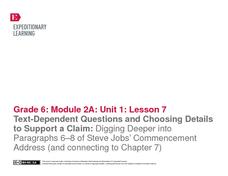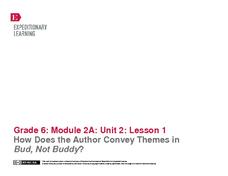Curated OER
Writing Organizers
Eight graphic organizers to choose from? That's right! Each of these organizers relates to writing or reading. From narrowing a writing topic, to responding to literature, to planning a writing project, you'll find many purposes for...
Curated OER
Rediscovering Forgotten Women Writers
Women's voices are becoming more prominent in the world of literature, but for centuries, this wasn't the case. Young historians research a woman whose writings are considered to be lost, out of print, or forgotten. They develop an oral...
Curated OER
"Zebra" by Chaim Potok
Combine art and literature to teach greater themes and symbolic meaning. Using the plan outlined in this resource, expose your class to the story "Zebra" by Chaim Potok, conduct discussions about social issues and nicknames, and ask...
Wake County Public Schools
Language
Have your class doing everything from reading literature, analyzing literary devices, identifying independent and dependent clauses, discussing, and writing creatively with the rich resource found here. After a mini lesson on independent...
Manchester College
What’s Your Point of View?
Work on deciphering the point of view of various pieces of literature. As readers review the concepts of first, second, and third person perspective, they apply what they know to different passages.
Penguin Books
Addressing Text Complexity - Making Independent Reading Meaningful
Many English teachers dream of a classroom full of readers silently enjoying their books. A useful guide helps make that dream become a reality by providing book recommendations for a range of readers. Each suggestion includes the...
Illinois State Board of Education
Common Core Teaching and Learning Strategies
Here's a resource that deserves a place in your curriculum library, whether or not your school has adopted the Common Core. Designed for middle and high school language arts classes, the packet is packed with teaching tips, materials,...
Scholastic
A Reading Guide to A Wrinkle in Time
Accompany a reading of Madeleine L'Engle's classic tale, A Wrinkle in Time, with a detailed guide equipped with 15 informative and useful chapters. Scholars discover who the author is, why she wrote the book, and crucial story elements...
Curated OER
Determining Author's Point of View: The Sneeches
Determine the author's point of view in a text. Young readers read Dr. Seuss' The Sneeches and identify the author's purpose in the story. They identify persuasive techniques in writing, asking and answering questions to better...
Curated OER
The Tell-Tale Hearts of Writers
Knock, knock, knock...Creep out your class with a critical thinking lesson plan focused on word relationships in Edgar Allen Poe's "The Tell-Tale Heart." They investigate the relationship between word choice, mood, and interpretation of...
Penguin Books
A Teacher's Guide to Lord of the Flies by William Golding
Many critics consider William Golding's Lord of the Flies as one of the best English language novels of the 20th century! It is also one of the 100 most challenged books taught in schools! Instructors willing to accept the challenge of...
Curated OER
Response to Literature: Anecdotal and Saga Memoir Poems
Students differentiate between anecdotal and saga memoir poems. In this response to literature lesson students analyze poems written by others then analyze incidents from their own lives to determine whether they meet the criteria for...
Curated OER
Traditional African Literature: The Gentleman and the Jungle
In this African literature instructional activity, students read "The Gentleman and the Jungle," and then respond to 6 short answers questions about the African folk tale.
Curated OER
Literature: Truly Fortunate Ahmed
Students gain an appreciation for Persian literature by reading "Truly Fortunate Ahmed." They select props such as turbans, rings, and clothing as they are revealed in the story. Among assessments from which students choose are:...
Curated OER
Outline for a Response to Literature
Students analyze Out of the Dust by Karen Hesse. In this literature review lesson students analyze an example of a response to literature along with an outline for creating one. They then answer questions based on Out of the Dust to...
EngageNY
Getting the Gist and Determining Word Meaning: Paragraphs 20–23 of Steve Jobs’ Commencement Address (and connecting to Chapter 10)
Groups create a list of the character traits of Steve Jobs and Buddy, the main character of Christopher Paul Curtis' Bud, Not Buddy, and share and select evidence from Jobs' 2005 Stanford University Commencement Address to support their...
EngageNY
Bud, Not Buddy: Launching the Novel and Understanding Its Context
The first lesson plan in a unit that uses Christopher Paul Curtis' award-winning depression-era novel, Bud, Not Buddy, as the anchor text establishes the routines that will be used throughout the unit.
EngageNY
Interpreting Figurative Language and Answering Selected Response Questions (Chapter 4)
To prepare for an assessment of how well individuals are progressing with their ability to identify and analyze figurative language and its effect on tone and meaning, pairs work through Chapter Four of Christopher Paul Curtis'...
EngageNY
Text-Dependent Questions Text-Dependent Questions and Making a Claim: Digging Deeper into Paragraphs 12–14 of Steve Jobs’ Commencement Address (and connecting to Chapter 9)
Readers draw connections between Bud, Not Buddy and Steve Jobs' 2005 Stanford University commencement address and cite evidence from the two texts to support their analysis.
EngageNY
Getting the Gist: Steve Jobs Commencement Address (Focus on Paragraphs 6-8, and connecting to Chapter 6)
As part of a unit study of Bud, Not Buddy, readers compare Buddy's list of rules to live by with those that Steve Jobs enumerates in his commencement address to Stanford's 2005 graduating class.
EngageNY
Text-Dependent Questions and Choosing Details to Support a Claim: Digging Deeper into Paragraphs 6–8 of Steve Jobs’ Commencement Address (and connecting to Chapter 7)
Readers learn how to choose specific details drawn from a primary source (Steve Jobs' 2005 Stanford University commencement address) to support an analysis of informative text.
EngageNY
How Does the Author Convey Themes in Bud, Not Buddy?
After reading up to chapter 12 of Bud, Not Buddy by Christopher Paul Curtis, scholars read chapter 13 and take part in a grand conversation about the author's writing techniques. Pupils discuss how his writing conveyed literary themes...
EngageNY
Writing: Drafting Body Paragraphs and Revising for Language
Begin the drafting phase of the writing process with a lesson plan focused on logically writing three body paragraphs. Then, revise the writing to make it more formal after a teacher-directed mini-lesson plan. Each paragraph highlights...
EngageNY
Planning for Writing: Introduction and Conclusion of a Literary Argument Essay
After completing three body paragraphs of an argument essay about life's rules to live by from Bud, Not Buddy Christopher Paul Curtis, it's time to begin writing the introduction and conclusion. Independently, pupils draft the final two...
Other popular searches
- English Literature Genres
- 6 8 English Literature
- Old English Literature
- English Literature History
- Olde English Literature
- English Literature Unit
- English Literature O Level
- English Literature Form
- Older English Literature
- Early English Literature
- English Literature Unit 13
- English Literature Canadian





